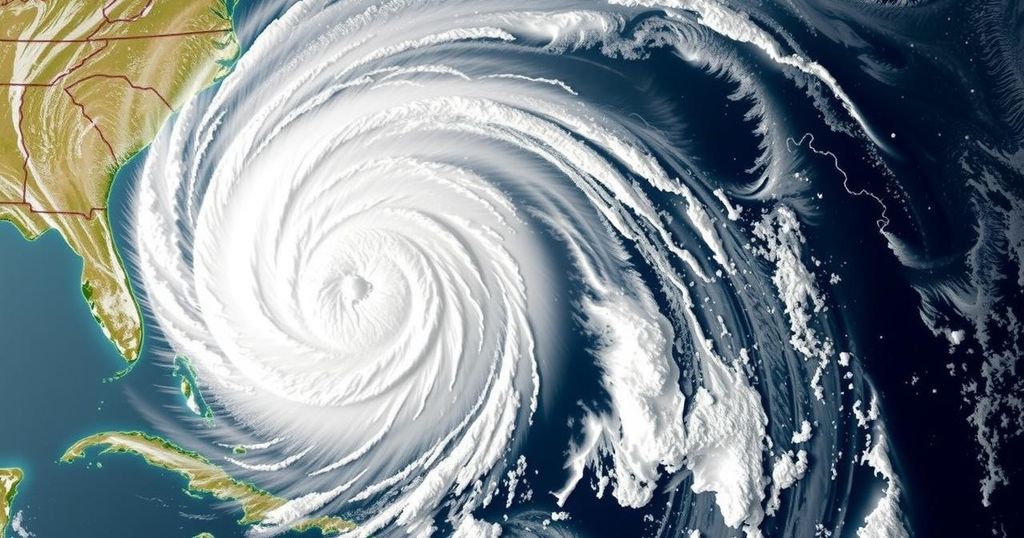Cyclone Chido Devastates Mayotte and Threatens Eastern Africa, Officials Warn

Cyclone Chido has devastated Mayotte, leading to several fatalities as it approaches Africa’s eastern coast. Wind speeds have exceeded 220 kph, causing significant structural damage and jeopardizing vulnerable populations. French authorities are mobilizing resources for rescue and support, while Comoros has also issued alerts amid concerns for missing fishermen. The cyclone poses severe risks to millions in Mozambique and neighboring countries as they prepare for potential flooding and evacuations.
Cyclone Chido has wrought significant havoc on the French territory of Mayotte, resulting in multiple fatalities as it continues on its course toward the east coast of Africa. French Interior Minister Bruno Retailleau reported that the initial count indicates at least some fatalities, but precise figures remain unavailable due to ongoing rescue assessment challenges. He expressed concerns over the potential for a higher death toll as the island appears to be severely affected.
Accompanied by winds exceeding 220 kph (136 mph), Chido resulted in considerable destruction across Mayotte, which is home to over 300,000 residents living across two main islands situated approximately 800 kilometers (497 miles) off the coast of Mozambique. Prime Minister François Bayrou noted extensive damages to public facilities, including hospitals and the airport, stressing the precarious conditions faced by many residents living in substandard housing.
French President Emmanuel Macron affirmed that he is monitoring the situation closely, while Mayotte’s prefect, François-Xavier Bieuville, highlighted that this cyclone is the most devastating the island has faced since 1934. As a response to the crisis, the French Interior Ministry has mobilized substantial resources, including 1,600 police and gendarmerie officers and numerous rescuers from France and the nearby territory of Réunion.
In addition, the nation of Comoros, which lies to the north of Mayotte, is also experiencing severe impacts from the cyclone, with heightened alerts issued in several areas. Authorities have taken precautions by halting maritime activities and closing transport hubs, expressing concern over missing fishermen who were at sea when the cyclone struck.
As Cyclone Chido progresses toward the mainland of Africa, particularly Mozambique, predictions suggest a potential impact on 2.5 million individuals in northern provinces. Nearby countries such as Malawi and Zimbabwe are also preparing for potential flooding and evacuations as the cyclone approaches.
The current cyclone season runs from December to March and has previously seen destructive events lead to significant loss of life and a vulnerability to waterborne diseases post-disaster. Rising concerns regarding climate change suggest that the intensification of such storms disproportionately burdens impoverished nations in southern Africa, which contribute minimally to global climate change yet face substantial humanitarian crises.
The context of Cyclone Chido’s devastation lies within the annual cyclone season of the southeastern Indian Ocean, typically spanning from December to March. This period has historically seen a series of powerful cyclones impacting countries in the region, particularly those in southern Africa. Previous cyclones such as Idai and Freddy resulted in significant fatalities and humanitarian crises, emphasizing the urgent need for early warnings and resilient infrastructure. Furthermore, the increasing severity of these natural disasters is often linked to the broader consequences of climate change, which keeps the burden on already vulnerable nations at a high level. These countries struggle with underinvestment and lack of resources to effectively manage disasters, exacerbating the impact of such cyclones.
In summary, Cyclone Chido has caused widespread destruction in Mayotte, resulting in fatalities and severe infrastructure damage, with significant repercussions anticipated along its trajectory towards mainland Africa. The responses from French authorities, alongside the emergency measures implemented in Comoros, reflect the urgent need to safeguard affected communities. Moreover, the increasing intensity of cyclones in this region raises critical concerns regarding climate change and its impact on the humanitarian landscape for poorer nations, which require urgent support as they navigate these crises.
Original Source: www.cnn.com






